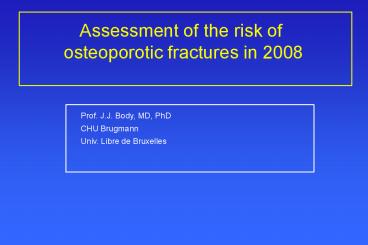Pr - PowerPoint PPT Presentation
1 / 21
Title: Pr
1
Assessment of the risk of osteoporotic fractures
in 2008
Prof. J.J. Body, MD, PhD CHU Brugmann Univ. Libre
de Bruxelles
2
Estimated lifetime fracture risk in 50-year-old
white women and men
Melton et al. JBMR 1992
3
- Lifetime risk of hip fracture in women aged 50
years
LTR ()
50
40
30
20
10
Osteoporosis
Osteopenia
Normal
0
0.6
0.7
0.8
0.9
1
1.1
1.2
0
-1
-2
-3
1
T-score (SD)
4
Patient screening
- The diagnosis of osteoporosis is based on bone
mass measurement (T score lt -2.5 SD). - However the risk of osteoporotic fracture is
multifactorial (function of bone mass AND other
risk factors) - Using only bone mass measurement as a screening
tool is not optimal (the test is not sensitive
enough)
5
Fracture risk is a gradient,NOT a threshold
Marshall et al., BMJ 1996
50 40 30 20 10 0
Relative risk of hip fracture
-4 -3 -2 -1
0
Age-adjusted SD score at femoral neck
6
FRAX model
- FRAX is an algorithm to assess absolute fracture
risk - It is a mega-analysis (almost 250,000 subject
years) - from 9 populations based cohorts
- It quantifies risk factors that have been used
qualitatively - for years
- Allows to
- find individuals at high risk of fractures from
a population - at modest risk (osteopenia)
- reduce chance of inappropriate treatment
7
- FRAX Cohorts studied
CaMoS
Hiroshima
EVOS / EPOS
Rochester
Sheffield
Rotterdam
Gothenburg I
Kuopio
Gothenberg II
Dubbo
OFELY
EPIDOS
n 59,232 person-years 249,898
female 74
Any fracture 5,444 osteoporotic fractures
3,495 hip fractures 957
8
- Risk factors in WHO predictive model
- Age
- Sex
- Femoral neck BMD
- Prior fragility fracture after age 501
- Body mass index
- Ever use of corticosteroids
- Secondary osteoporosis (e.g., rheumatoid
arthritis) - Parental history of hip fracture
- Current cigarette smoking
- Alcohol intake gt 2 units/day
1hip, spine, distal forearm, proximal humerus,
pelvis, ribs, proximal tibia in women
9
Alcohol, tobacco and Osteoporosis
Chronic alcohol / tobacco abuse is detrimental to
bone health, with one of the mechanisms being a
direct toxic effect on bone forming cells.
IOF (2001) Osteoporosis in the European
Community A Call to Action.
10
FRAX (Fracture Risk Assessment X)
http//www.shef.ac.uk/FRAX/tool.jsp?locationValue
12
11
FRAX (Fracture Risk Assessment X)
http//www.shef.ac.uk/FRAX/tool.jsp?locationValue
12
12
Risk factors for osteoporotic fractures (HIP)
Remaining significant after adjustment for bone
mass
- AGE
- HISTORY OF NONTRAUMATIC FRACTURE
- any fracture after 50 years RR to 1.62
- FAMILIAL HISTORY FO HIP FRACTURE (mother or
father) - RR to 2.28
- BMI lt 20 RR to 1.42
- CORTICOSTEROID USE RR to 2.25
- TABAGISM RR to 1.60
- ALCOHOL (gt 2 glasses/day) RR to 1.70
tendency to fall, early menopause, sedentarity,
13
Most Osteoporotic Fractures Occur in a Fall
14
Prediction of absolute risk of fracture by
validation of risk factors in a Belgian cohort
followed during 10 years
- FRISBEE
- (Fractures RIsk Study Brussels Epidemiological
Enquiry)
15
Investigators
Sponsors
- CHU Brugmann JJ Body
- P. Bergmann
- A. Peretz
- CHU St-Pierre S. Rozenberg
- M. Tondeur
- IRIS Sud A. Mindlin
- M. Rubinstein
- Inst. J. Bordet M. Paesmans
- M. Moreau
- A. Grivegnée
- GPs JM Thomas
- M. Roland
- IRIS-RECHERCHE
- Merck Sharp Dohme
- Roche
- Procter Gamble
- Novartis
16
Objectives
- Determine the absolute risk fracture ()
- at 5 and 10 years (establishment of a risk
model) - Determine the relative importance of risk
- factors in a Belgian population.
17
Methodology
- Prospective study
- Population women 60 80 years old selected
- from population lists of 6 communes in Brussels
- Target 5000 (800 screened as of today)
- Yearly phone calls (fractures, serious deseases,
- started / changed osteoporosis therapy
18
Methodology
- Explanatory variables collected during the
interview - Age
- History of hip fracture (mother, father)
- Personal history of fracture after 50 years
- Diseases known to be a cause of secondary
osteoporosis - BMI lt 20
- History of corticosteroid use
- Tabagism
- Excessive alcohol consumption
19
Methodology
- Other explanatory variables collected during the
interview - Physical activity (sedentarity)
- Menopause lt 45 years
- Fall tendency
- Use of sleeping pills
- Ethnic origin
- Veil wearing
- Hormone replacement therapy
- Osteoporosis treatment (bisphosphonates, )
- Supplements of calcium / Vit D
20
Methodology
- Explanatory variables collected during the visit
- Measure of bone mineral density (DXA)
21
Methodology
- Response variables
- Fractures (validated)
- yearly telephone contact































